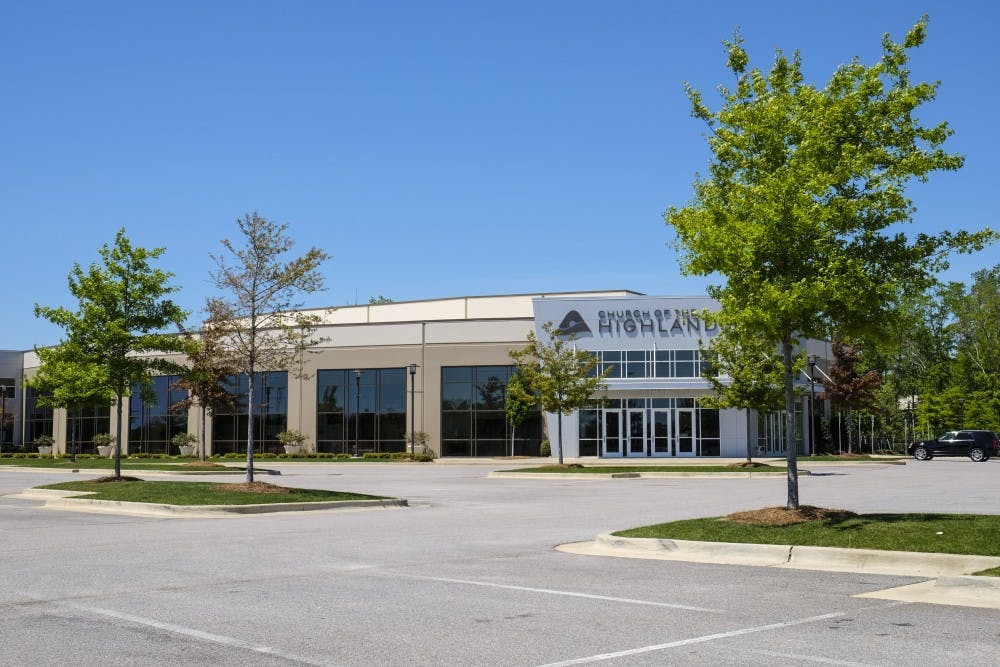Two churches in the Auburn area – Church of the Highlands and Auburn Community Church – can be classified as “megachurches” because of the amount of students and families drawn to them each week.
The Hartford Institute for Religion Research defines a megachurch as a church with several distinct characteristics, including having at least 2,000 members, a charismatic senior minister and an innovative and contemporary worship format. Its website reads, “This church form is a distinctive organizational response to cultural shifts and changes in societal patterns throughout the industrialized, urban and suburban areas of the world.”
These churches’ mission statements share how they attempt to aim for the hearts of people who might have had a negative church experience in the past.
Part of Church of the Highland’s “why we exist” statement reads, “Our hope is to give you a place where you experience a fresh, enjoyable connection to God and a community of people.”
ACC defines itself on its website as a movement, adapting to society’s increasing appetite for an easy-access lifestyle.
“We are people, not a place,” the church states in its vision statement. “We are a movement, not a meeting. Our hope is that people would leave behind not only their sins but also mediocrity, lukewarm living, and half-hearted cultural Christianity.”
McKenley Parker, junior in finance, serves on the Student Serve Team at Highlands. Parker grew up attending a medium-sized Methodist church, but immediately felt at home once she attended Church of the Highlands, Parker said.
“I would say that larger churches in Auburn have more ministries, programs, and events in place for college students,” she said. “Because these megachurches are in college towns, they put large amounts of time and effort to serve college students, drawing in a largely college church body.”
Jake Christner also grew up in a Methodist church and now attends Auburn Community Church.
“I like how modern it is,” Christner said. “I went to a traditional Presbyterian church recently, and I just felt like it wasn’t as relatable. I think that bigger churches like ACC are generally more relatable to our generation without doing so in an overbearing way.”
People who attend megachurches appreciate their pastors’ passion, Christner said.
“Miles is very fired up and very convicting, and it’s so easy to relate to your life and is very powerful speaking compared to traditional preaching,” he said.
Kathryn King, junior in Spanish, grew up attending a traditional Episcopalian church and now attends ACC.
“I tried out four traditional churches, and I really did like those churches,” King said. “I went to ACC last, and it was the one church that I felt like I didn’t want to miss a Sunday because I knew that I would encounter God every single week.”
ACC brought a new outlook of Christianity into her life, King said.
“I felt like it was more real for where I am at right now,” she said. “I appreciated that ACC taught about the relational side of Christianity, not just the informational side.”
The sermons of ACC and Highlands are not as formal and strict as a traditional church.
The sermons are being presented in everyday language that is more applicable to all kinds of people, King said.
Christner, King and Parker agreed that the larger church aspect itself did not draw them to their megachurch. In fact, the size was the only thing that King and Parker didn’t love from the beginning.
“I was skeptical of being able to find a community in such a big church, but I’ve found that ACC provides the small church feel if you are willing to go to community groups and get involved,” King said.
Students appreciate the accepting atmosphere of these churches, feeling as though they don’t have to come with their lives all together, but can come as they are, King said.
“I think the pull is the authenticity and the realness of ACC,” she said. “We don’t have to provide our best selves every Sunday. We come as we are and are accepted for that.”
Do you like this story? The Plainsman doesn't accept money from tuition or student fees, and we don't charge a subscription fee. But you can donate to support The Plainsman.





